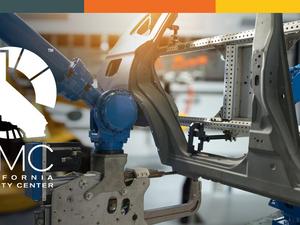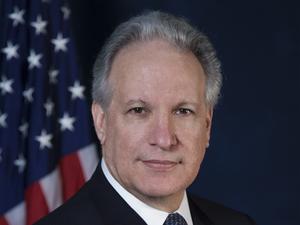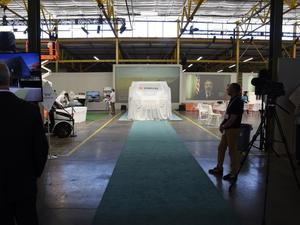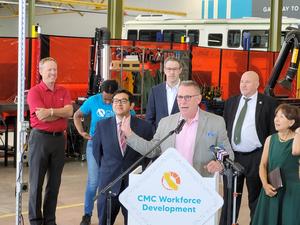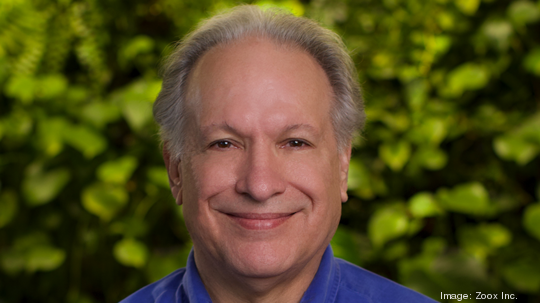
Mark Rosekind sees great opportunities ahead for the California Mobility Center, the Sacramento-based private-public entity that seeks to foster zero-carbon future mobility technologies.
Near the front door of the mobility center's Depot Park office is a banner that reads: "California is the gateway to mobility success."
Rosekind sees that sentence as more than just a pithy phrase, but as a mission statement that can be fulfilled, both with the center's office space and in its ramp-up center and prototyping lab.
Rosekind has been serving as the CMC's first CEO since October, following a career in safety and transportation in California and Washington, D.C. Rosekind is a former administrator of the National Highway Traffic Safety Administration, leading the agency through the recall of defective Takata airbags, which is still the largest product recall in history.
California has long been the largest domestic car-sales market. Through California regulations dating back to the early 1970s, the state's mandates have become de facto regulatory standards for the whole country, and then also for the world.
California is again dictating industry standards by having the most aggressive zero-carbon transportation goals, including banning the sale of new carbon-emitting cars by 2035.
Those standards are set in Sacramento, and global industries and regulators know it.
“People look to California for those guidelines,” Rosekind said. And when they look to California, they should look at Sacramento, and that is an opportunity for the California Mobility Center.
The center, opened nearly two years ago, has made great strides since its launch, particularly since that coincided with the pandemic, Rosekind said.
Backed by local groups to grow a clean-mobility industry in Sacramento and provide equitable job opportunities in future transportation technology for Sacramento residents, the center already has connections with international partners.
But while the Mobility Center has seen some success, Rosekind said it can do better. "We can hone the value.”
Rosekind said that will involve bringing in many more members and partners in the transportation industry, zero-carbon innovators, battery technology companies, manufacturers and others.
The more members the center has, the more value it has to all those members, he said, as there is tremendous value in the ability to network.
“I’d like to see it be huge. Volume matters,” Rosekind said.
The center has more than 30 partnerships with everything from grid technology companies to electric vehicle startups and even international utilities.
It was an auspicious start, Rosekind said, but he wants the center to expand its roster of members to include many more companies and technologies that touch transportation or mobility, either directly or tangentially. He wants to keep the boundaries of membership broad, taking in software, infrastructure and hardware members who can all benefit from being connected.
The center has office space for startups and for companies that want to be connected to the zero-carbon transportation future; and it has a ramp-up shop for companies that need tools and equipment to prototype new hardware.
The current CMC is in 25,000 square feet at Depot Park, but the center plans to eventually open a $120 million first-phase version of a larger CMC near the California State University Sacramento campus. That center would work in concert with local universities and colleges, particularly with engineering schools.
Rosekind sees value in the connection with engineering students working with the center to create a feedback loop of the latest transportation technology between innovative companies and academia. That connection has the potential to build into an international center of excellence for transportation technology.
Rosekind also sees potential in the center’s connection with its founding sponsor, the Sacramento Municipal Utility District, which committed to providing $15 million in funding to the center if it meets goals. SMUD has a long history of innovation, and it is a powerful partner, he said.
Sustainability and equity have been goals of the center since SMUD launched it as an idea early in 2019 and funded its first feasibility studies.
Rosekind added safety to the CMC’s primary goals. With his long background in transportation safety, Rosekind is adamant that the center cannot look at transportation and mobility without including the issue of safety.
Safety writ large means everything from avoiding traffic accidents to making sure new battery technologies don’t set your car, and your home, on fire.
Rosekind led the NHTSA from 2014 through 2016, appointed by then-President Barack Obama. Rosekind was also a member of the National Transportation Safety Board from 2010 to 2014. Previously, he has also worked at NASA in safety.
Both Rosekind and his wife drive electric cars. He won’t say which brands as he doesn’t want to be seen as endorsing or alienating anyone.
For his first few months at CMC, he’s been meeting with groups, members and others to get a feel for the center. He is putting together his plan for the CMC going forward to present to its board of directors early next year. He also spent a week in Washington, D.C. on behalf of the CMC reconnecting with national groups.
“He is tremendously qualified and his connections in Washington will be valuable to the center,” said Mark Rawson, the executive who opened the California Mobility Center. Rawson has moved on to a position with Rhythmos, a Colorado technology company that helps utilities and fleet operators optimize electric vehicle charging to be cheaper and less straining on the grid.
Rawson said Rosekind’s effort to expand membership dramatically is exactly what the center needs.
In the lead-up to starting the center, Sacramento officials toured Germany
In 2018, the Greater Sacramento Economic Council sent a delegation of Sacramento officials to visit Rhine-Westphalia Technical University of Aachen and a prototyping spinoff PEM Aachen GmbH. A Sacramento delegation also attended trade shows in Germany.
While those efforts gave Sacramento many good ideas, Rosekind said the center now must forge its own path.
“We’re not going back to Germany,” he said. It is a completely different industry, education and regulatory environment, he said, adding that the CMC has to be designed and built for what’s on the ground in the U.S. and in California.
The Essentials
CEO, California Mobility Center
Age: 67
Education: Post-doctoral fellowship in sleep and chronobiology, Brown University Medical School, 1987-1989; master’s and doctorate degree in clinical psychology and psychophysiology, Yale University, 1980-1987; bachelor’s in psychology from Stanford University, 1973-1977.
Career: CMC CEO, October 2022 to present; chief safety officer, Zoox Inc., 2017-2022; administrator, National Highway Traffic Safety Administration, 2014-2017; board member, National Transportation Safety Board, 2010-2014; president, Alertness Solutions, 1998-2010; director of Fatigue Countermeasures Program at NASA Ames Research Center, 1990-1997; director, Center for Human Sleep Research / Stanford University Sleep Center, 1989-1990.
Personal/family: Married to Debbie for 37 years, two adult children. Lives in Mountain View.
Something people would be surprised to know about you: Doesn’t drink coffee or tea. Prefers to take short naps to recharge during the day.
